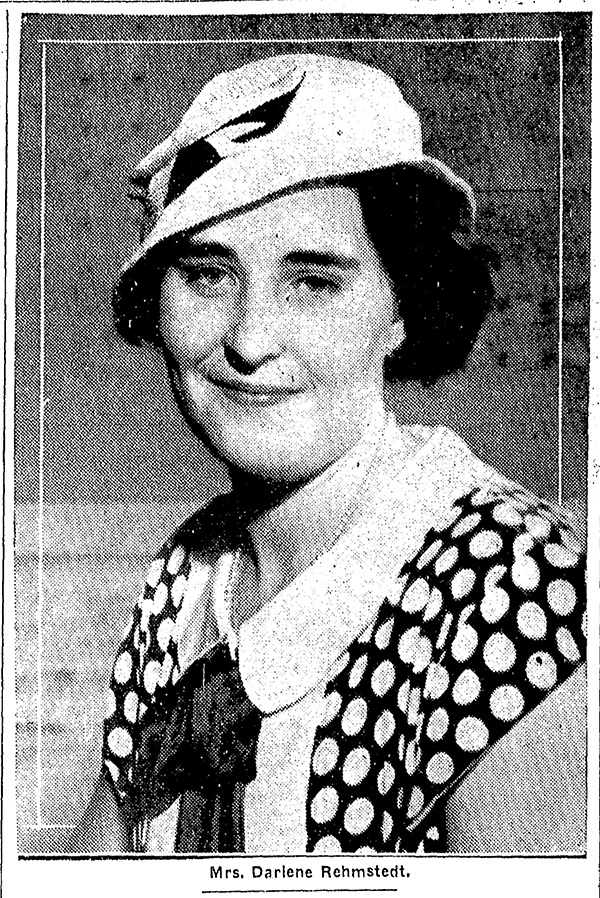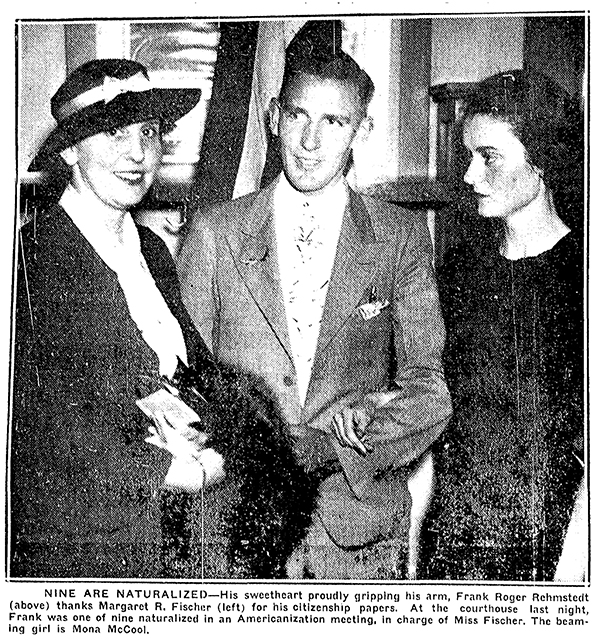
“The car above, ribboned and tin-can-hung, drove around South Omaha Monday as Frank Rehmstedt, 27, packing house employee, celebrated the obtaining of a divorce by his wife, Darlene, 17. The machine dragged a dishpan and a wash-boiler.” —Omaha World-Herald, August 22, 1934. History Nebraska RG3021-7-28
By David L. Bristow, Editor
Frank wanted attention and he got it. Syndicated by the Associated Press, the above photo and caption appeared in newspapers nationwide.
But only Omaha readers followed the demise of the Rehmstedts’ brief marriage as it played out in local newspapers. At a time when women were still expected to obey their husbands, the case shows the limits of what was considered acceptable behavior. It also shows how a sensation-driven press could turn private matters into a public spectacle.
Frank and Darlene were married in her sister’s living room in October 1933. Home weddings were common then, and the newspaper notice was standard stuff, noting that the bride wore a dress of pale blue crepe (white wedding dresses were not yet standard) and that the living room was “decorated with autumn flowers.” Frank and Darlene were not wealthy people—he worked in a meatpacking plant and she was a cook—but even in a brief wedding announcement, details about costume and decoration echoed the more elaborate descriptions of “society” weddings.
Less than five months later the couple appeared in the World-Herald’s “In Divorce Court” listings: “Darlene vs. Frank Rehmstedt, cruelty.” Before modern “no-fault” divorce, one party had to charge the other with wrongdoing—usually adultery, desertion, or cruelty—and then persuade a judge to grant the divorce, sometimes over the other party’s wishes.
Frank didn’t want Darlene to leave. On the same day the World-Herald printed the divorce court notice, the rival Bee-News ran a story under the headline “DEATH ‘PASSES,’ YOUTH WINS ON SUICIDE BLUFF.”
Frank Remstedt’s suicide bluff Saturday was nearly called by death.
The 24-year-old German youth, married five months, was found unconscious from gas on the floor of his home at 2460 So. 20th St. by his mother-in-law… When he was revived later at police headquarters hospital, he said:
“I didn’t intend to die. I told my wife we had to get a smaller house, but she said we had to have five rooms to take care of her mother. I told her I didn’t marry her family, and we quarreled.”
Frank said he packed his clothes and left, “as a bluff I was leaving”—but when he came home some of the furniture was gone. He decided to play for Darlene’s sympathy. Sure that Darlene and her family would come back for more furniture, he wrote a suicide note and turned on the gas when he thought they were coming. The last thing he remembered before blacking out was looking through the window to watch for them.
Darlene’s mother and sister found him and saved his life. Darlene held off on the divorce for another five months.
Newspapers of the time not only printed the cause of each divorce, but sometimes also wrote lively features on colorful cases, even if no criminal wrongdoing was alleged. Frank and Darlene’s case drew the attention of both Omaha dailies, which published photos of the youthful Darlene.

Omaha World-Herald, Aug. 21, 1934
“Wife, 17, Granted Divorce When Husband Criticizes her Cooking in Comparison With Dishes Mother Made,” ran the headline in the Bee-News, which discussed the “relative merits of German and American cooking” in a lighthearted piece that quoted Judge Herbert Rhoades as saying, “The court assumes that every man has told his wife at some time or other that she doesn’t cook as well as his mother.”
The World-Herald, meanwhile, said Darlene’s testimony alternated “between tears and flashes of anger” as she described how Frank demanded that she wait upon him hand and foot, pronounced her cooking unfit to eat (she was employed as a cook), set an alarm when her friends came to visit (sending them home when it rang), and apparently still had feelings for the woman he lived with before he married Darlene.
“He slept late Sunday mornings,” Darlene said. “I had to bring his breakfast to him in bed. If I didn’t, there was hell popping the rest of the day.” She told the court she would rather be “six feet under the sod” than live with him again.
The judge granted the divorce and ordered Frank to pay court costs and $75 attorney’s fees. Frank, as we have seen, decorated his car and went for a noisy drive through the streets of South Omaha. The following year he again made local papers as part of a naturalization ceremony. Read the caption carefully:

Omaha World-Herald, June 22, 1935
“NINE ARE NATURALIZED—His sweetheart proudly gripping his arm, Frank Roger Rehmstedt (above) thanks Margaret R. Fischer (left) for his citizenship papers. At the courthouse last night, Frank was one of nine naturalized in an Americanization meeting, in charge of Miss Fischer. The beaming girl is Mona McCool.” (World-Herald, June 22, 1935)
The beaming girl…. Well played, World-Herald, well played.
Read about divorce cases in Seward County, Nebraska, in the nineteenth and early twentieth centuries.
Sources:
“Darlene Johnston Weds F. Rehmstedt,” Omaha World-Herald, Oct. 14, 1933.
“Fall Flowers Decoration at Home Wedding,” Omaha Sunday Bee-News, Oct. 15, 1933.
“In Divorce Court,” Omaha World-Herald, March 6, 1934, 18.
“Death ‘Passes,’ Youth Wins on Suicide Bluff,” Omaha Sunday Bee-News, March 4, 1934, 3.
“Wife, 17, Granted Divorce When Husband Criticizes her Cooking in Comparison With Dishes Mother Made,” Omaha Evening Bee-News, Aug. 20, 1934, 2.
“Says Servant of Mate; Bride, 17, Gets Divorce,” Omaha World-Herald, Aug. 21, 1934, 8.
(Posted May 9, 2023)



